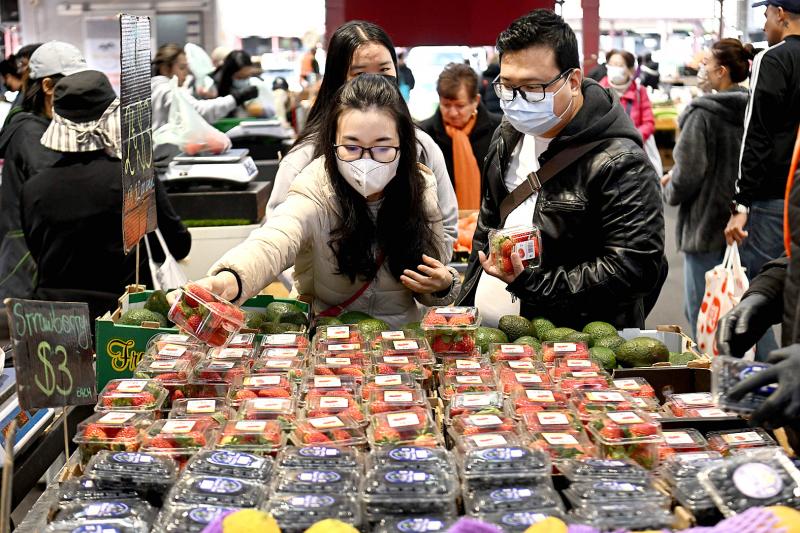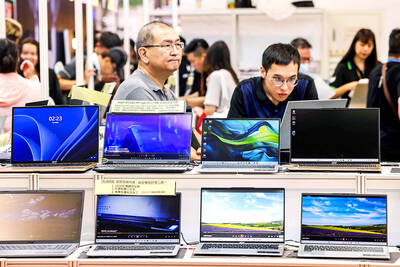Australia’s central bank yesterday lifted its benchmark interest rate for a third time in three straight months, changing the cash rate to 1.35 percent from 0.85 percent.
The Reserve Bank of Australia’s (RBA) half a percentage point rise was the same size as its increase last month.
When the bank lifted the rate by a quarter percentage point at its monthly board meeting in May, it was its first rate hike in more than 11 years.

Photo: AFP
RBA Governor Philip Lowe yesterday said that inflation in Australia was high, although not as high as it is in many other countries.
“Global factors account for much of the increase in inflation in Australia, but domestic factors are also playing a role,” Lowe said in a statement.
“Strong demand, a tight labor market and capacity constraints in some sectors are contributing to the upward pressure on prices,” he said, adding that recent floods were affecting some prices.
The board expects to take further steps “over the months ahead,” he said.
“The size and timing of future interest rate increases will be guided by the incoming data and the board’s assessment of the outlook for inflation and the labor market,” Lowe added.
Australia’s annual inflation rate rose to 5.1 percent in the March quarter, the highest annual rate since 2001 and sharply higher than the annual 3.5 percent rate reported three months earlier. The rise was driven by a surge in fuel and housing costs and damage to crops from floods last year.
Flooding in Sydney and its surrounds since Saturday has further damaged crops in the region and will likely increase prices of some fruits and vegetables.
Inflation data for the June quarter will be released on July 27, raising prospects of another rate hike at the bank’s August board meeting less than a week later.
Lowe last month forecast that inflation would peak at 7 percent late this year.
Treasurer of Australia Jim Chalmers said neither the RBA nor the Treasury Department was forecasting that rising interest rates would push the Australian economy into recession.
“The way I look at it is our economy is growing, but so are our challenges,” Chalmers said.
He added that the latest rate hike was “very challenging news for hardworking Australians already doing it tough.”
Australia’s housing market has already responded to the previous rate rises. The Corelogic Home Value Index for last month showed house prices in Sydney, Australia’s most populous city, and Melbourne, its second-most populous, fell 2.8 percent and 1.8 percent respectively over the quarter.

TECH TITAN: Pandemic-era demand for semiconductors turbocharged the nation’s GDP per capita to surpass South Korea’s, but it still remains half that of Singapore Taiwan is set to surpass South Korea this year in terms of wealth for the first time in more than two decades, marking a shift in Asia’s economic ranks made possible by the ascent of Taiwan Semiconductor Manufacturing Co (TSMC, 台積電). According to the latest forecasts released on Thursday by the central bank, Taiwan’s GDP is expected to expand 4.55 percent this year, a further upward revision from the 4.45 percent estimate made by the statistics bureau last month. The growth trajectory puts Taiwan on track to exceed South Korea’s GDP per capita — a key measure of living standards — a

READY TO HELP: Should TSMC require assistance, the government would fully cooperate in helping to speed up the establishment of the Chiayi plant, an official said Taiwan Semiconductor Manufacturing Co (TSMC, 台積電) yesterday said its investment plans in Taiwan are “unchanged” amid speculation that the chipmaker might have suspended construction work on its second chip packaging plant in Chiayi County and plans to move equipment arranged for the plant to the US. The Chinese-language Economic Daily News reported earlier yesterday that TSMC had halted the construction of the chip packaging plant, which was scheduled to be completed next year and begin mass production in 2028. TSMC did not directly address whether construction of the plant had halted, but said its investment plans in Taiwan remain “unchanged.” The chipmaker started

MORTGAGE WORRIES: About 34% of respondents to a survey said they would approach multiple lenders to pay for a home, while 29.2% said they would ask family for help New housing projects in Taiwan’s six special municipalities, as well as Hsinchu city and county, are projected to total NT$710.65 billion (US$23.61 billion) in the upcoming fall sales season, a record 30 percent decrease from a year earlier, as tighter mortgage rules prompt developers to pull back, property listing platform 591.com (591新建案) said yesterday. The number of projects has also fallen to 312, a more than 20 percent decrease year-on-year, underscoring weakening sentiment and momentum amid lingering policy and financing headwinds. New Taipei City and Taoyuan bucked the downturn in project value, while Taipei, Hsinchu city and county, Taichung, Tainan and Kaohsiung

Micro-Star International Co (MSI, 微星科技) is expanding notebook computer production in India after partnering with Indian electronics maker Syrma SGS Technology Ltd late last year, as the Taiwanese company seeks to tap into the local market. MSI also plans to manufacture some of its new gaming PCs powered by Nvidia Corp’s RTX 50 graphics cards in India, while adding more advanced and design-focused PCs and notebooks at Syrma’s plant in Chennai, a source told the Taipei Times yesterday on condition of anonymity. MSI’s deployment in India is driven not only by cost advantages, but also by India’s rapidly expanding consumer market and